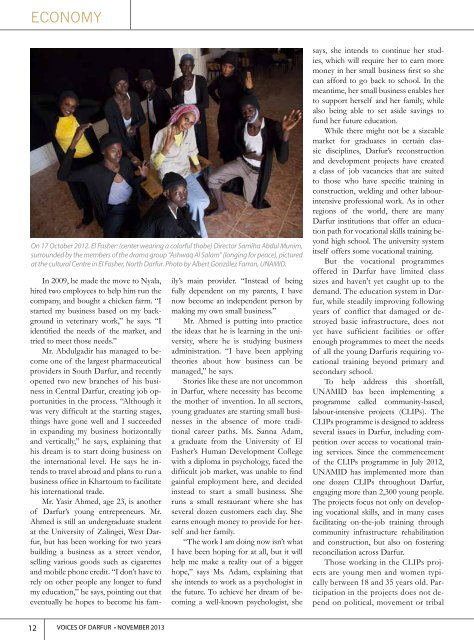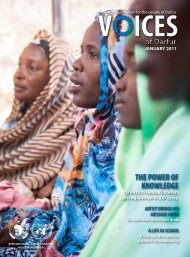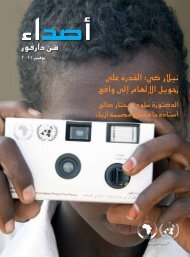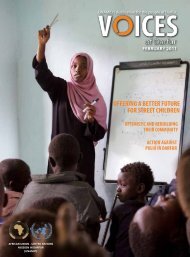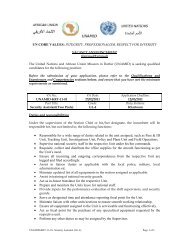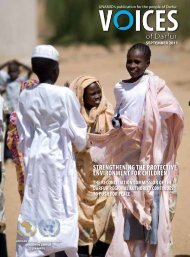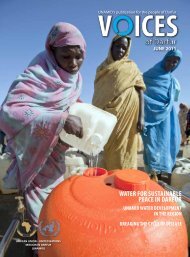Darfur Dances
Download the magazine (PDF) here. - Unamid
Download the magazine (PDF) here. - Unamid
- No tags were found...
You also want an ePaper? Increase the reach of your titles
YUMPU automatically turns print PDFs into web optimized ePapers that Google loves.
ECONOMY<br />
On 17 October 2012. El Fasher: (center wearing a colorful thobe) Director Samiha Abdul Munim,<br />
surrounded by the members of the drama group “Ashwaq Al Salam” (longing for peace), pictured<br />
at the cultural Centre in El Fasher, North <strong>Darfur</strong>. Photo by Albert González Farran, UNAMID.<br />
In 2009, he made the move to Nyala,<br />
hired two employees to help him run the<br />
company, and bought a chicken farm. “I<br />
started my business based on my background<br />
in veterinary work,” he says. “I<br />
identified the needs of the market, and<br />
tried to meet those needs.”<br />
Mr. Abdulgadir has managed to become<br />
one of the largest pharmaceutical<br />
providers in South <strong>Darfur</strong>, and recently<br />
opened two new branches of his business<br />
in Central <strong>Darfur</strong>, creating job opportunities<br />
in the process. “Although it<br />
was very difficult at the starting stages,<br />
things have gone well and I succeeded<br />
in expanding my business horizontally<br />
and vertically,” he says, explaining that<br />
his dream is to start doing business on<br />
the international level. He says he intends<br />
to travel abroad and plans to run a<br />
business office in Khartoum to facilitate<br />
his international trade.<br />
Mr. Yasir Ahmed, age 23, is another<br />
of <strong>Darfur</strong>’s young entrepreneurs. Mr.<br />
Ahmed is still an undergraduate student<br />
at the University of Zalingei, West <strong>Darfur</strong>,<br />
but has been working for two years<br />
building a business as a street vendor,<br />
selling various goods such as cigarettes<br />
and mobile phone credit. “I don’t have to<br />
rely on other people any longer to fund<br />
my education,” he says, pointing out that<br />
eventually he hopes to become his family’s<br />
main provider. “Instead of being<br />
fully dependent on my parents, I have<br />
now become an independent person by<br />
making my own small business.”<br />
Mr. Ahmed is putting into practice<br />
the ideas that he is learning in the university,<br />
where he is studying business<br />
administration. “I have been applying<br />
theories about how business can be<br />
managed,” he says.<br />
Stories like these are not uncommon<br />
in <strong>Darfur</strong>, where necessity has become<br />
the mother of invention. In all sectors,<br />
young graduates are starting small businesses<br />
in the absence of more traditional<br />
career paths. Ms. Sanna Adam,<br />
a graduate from the University of El<br />
Fasher’s Human Development College<br />
with a diploma in psychology, faced the<br />
difficult job market, was unable to find<br />
gainful employment here, and decided<br />
instead to start a small business. She<br />
runs a small restaurant where she has<br />
several dozen customers each day. She<br />
earns enough money to provide for herself<br />
and her family.<br />
“The work I am doing now isn’t what<br />
I have been hoping for at all, but it will<br />
help me make a reality out of a bigger<br />
hope,” says Ms. Adam, explaining that<br />
she intends to work as a psychologist in<br />
the future. To achieve her dream of becoming<br />
a well-known psychologist, she<br />
says, she intends to continue her studies,<br />
which will require her to earn more<br />
money in her small business first so she<br />
can afford to go back to school. In the<br />
meantime, her small business enables her<br />
to support herself and her family, while<br />
also being able to set aside savings to<br />
fund her future education.<br />
While there might not be a sizeable<br />
market for graduates in certain classic<br />
disciplines, <strong>Darfur</strong>’s reconstruction<br />
and development projects have created<br />
a class of job vacancies that are suited<br />
to those who have specific training in<br />
construction, welding and other labourintensive<br />
professional work. As in other<br />
regions of the world, there are many<br />
<strong>Darfur</strong> institutions that offer an education<br />
path for vocational skills training beyond<br />
high school. The university system<br />
itself offers some vocational training.<br />
But the vocational programmes<br />
offered in <strong>Darfur</strong> have limited class<br />
sizes and haven’t yet caught up to the<br />
demand. The education system in <strong>Darfur</strong>,<br />
while steadily improving following<br />
years of conflict that damaged or destroyed<br />
basic infrastructure, does not<br />
yet have sufficient facilities or offer<br />
enough programmes to meet the needs<br />
of all the young <strong>Darfur</strong>is requiring vocational<br />
training beyond primary and<br />
secondary school.<br />
To help address this shortfall,<br />
UNAMID has been implementing a<br />
programme called community-based,<br />
labour-intensive projects (CLIPs). The<br />
CLIPs programme is designed to address<br />
several issues in <strong>Darfur</strong>, including competition<br />
over access to vocational training<br />
services. Since the commencement<br />
of the CLIPs programme in July 2012,<br />
UNAMID has implemented more than<br />
one dozen CLIPs throughout <strong>Darfur</strong>,<br />
engaging more than 2,300 young people.<br />
The projects focus not only on developing<br />
vocational skills, and in many cases<br />
facilitating on-the-job training through<br />
community infrastructure rehabilitation<br />
and construction, but also on fostering<br />
reconciliation across <strong>Darfur</strong>.<br />
Those working in the CLIPs projects<br />
are young men and women typically<br />
between 18 and 35 years old. Participation<br />
in the projects does not depend<br />
on political, movement or tribal<br />
12 VOICES OF DARFUR • NOVEMBER 2013


